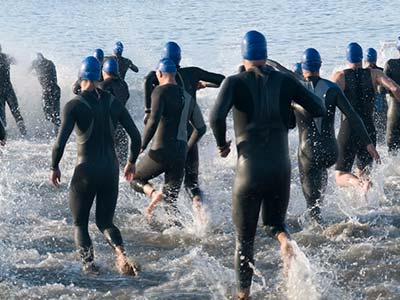 Last weekend I had the opportunity to talk to a couple of our BSC athletes while they were lined up for their race swim start. Both of them said the same thing to me – “I’m pretty nervous.” That struck me as odd since both athletes have several years of long course triathlon experience.
Last weekend I had the opportunity to talk to a couple of our BSC athletes while they were lined up for their race swim start. Both of them said the same thing to me – “I’m pretty nervous.” That struck me as odd since both athletes have several years of long course triathlon experience.
Do you share their sentiments? Are you nervous before your race starts? In this article, I’m going to give you some tips to help calm your nerves.
It’s normal to experience a bit of nervousness before a race – any race – be it a swim, bike, or run event, and yes, even a triathlon. “Butterflies” or a bit of nervousness is good, it’s a sign of excitement and focus. However, too much nervousness can become detrimental.
Source of Race Day Nerves
The source of pre-race nerves generally is found in one of three categories:
- Fear of physical danger – e.g. rough water, rainy bike, etc.
- Fear of pain/suffering – e.g. the end of a full-distance marathon, etc.
- Fear of failure – e.g. not meeting goals, not finishing the race, etc.
Whatever the origin of your fear, here are a couple of things that can help –
Rehearse Your Fears
One of the best ways to reduce pre-race nerves is to rehearse the part you are most anxious about. Examples might include riding steep hills – both up and down. Swimming in rough or even extremely rough water. You’ll build confidence every time you overcome whatever causes your apprehension. At BSC our philosophy is to have our athletes complete workouts that are more challenging than anything they will see on race day. If your race includes large hills, you need to ride large hills in training, if your race starts with an ocean swim, you should swim in the ocean before race day, etc.
We have all of our athlete’s complete race simulations in the final weeks of their training plans. While that’s effective, the best way to overcome pre-race anxiety is to prepare and rehearse for your race by doing another race. For example, if your “A” race is a half-distance triathlon, find a low-key local Olympic or Sprint triathlon a few weeks before the “A” race. It’s fun, and you’ll be rehearsing under race conditions with no expectation other than to practice. It’s a great way to prepare, learn from your mistakes, and gain experience without the pressure of an “A” race.
Realistic Race Day Expectations
It continually amazes me when I hear an athlete who’s never run faster than 10: 00/mile, say they’re going to run a sub-three-hour marathon (6:52/mile) at the end of a full distance triathlon. Setting goals that are merely pipe-dreams will only serve to increase anxiety and set you up for failure. I’ve talked in the past about keeping accurate training logs. By reflecting on your logs you can determine accurate pacing goals and time expectations for your race.
While it’s natural to establish a time expectation, resist the urge to pursue a specific goal time or finish position. You don’t know what race day conditions will be like nor do you know who’s going to show up for the race. Use your training logs to set REALISTIC heart rate, pace, or power goals throughout your race. Then adjust those goals in real-time if conditions warrant a change (e.g. hot, humid conditions, rain, etc.). Focus on the process – which you can control, rather than the outcome – which you can’t control. That will help ease your nerves.
Remember this is Fun
When you entered your first triathlon, you may well have done it because you thought completing a triathlon would be fun. Then the competitive juices kick in and we gradually get to where it seems the Earth will slip off its axis if we don’t do well. The simple reality is that you aren’t going to PR every race. To expect that you will, will merely place pressure on yourself, increase the nerves, and set you up for disappointment – which further elevates the nerves the next time. Take a minute before your next race and remember this is supposed to be fun!
Happy racing!
